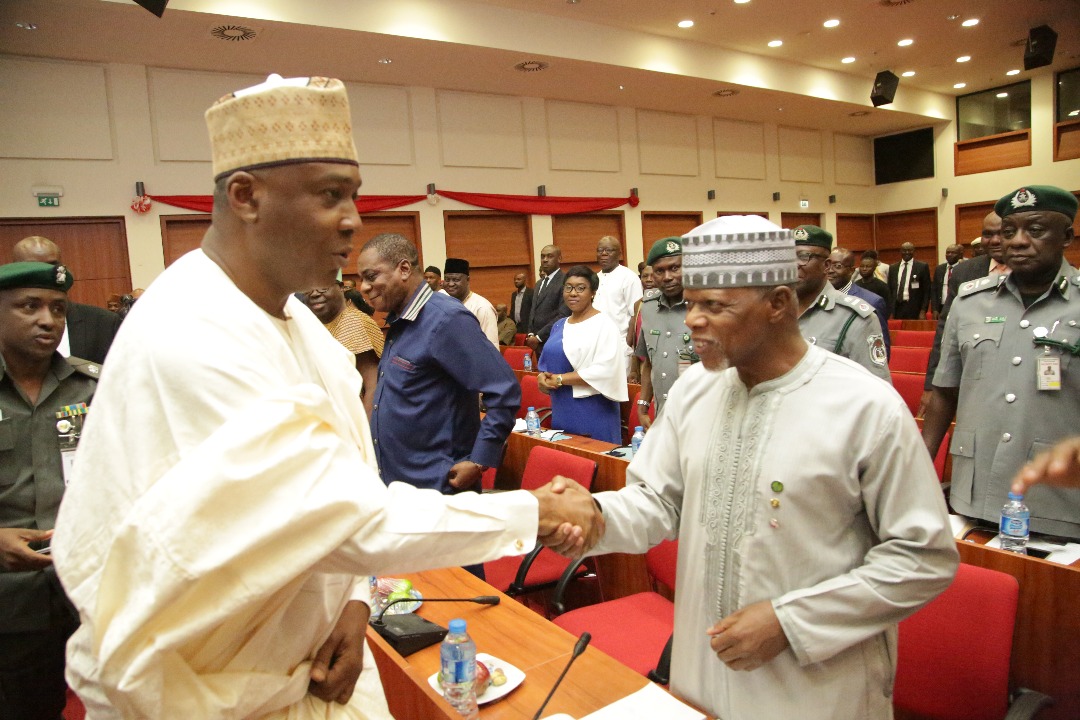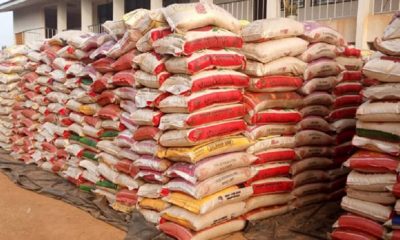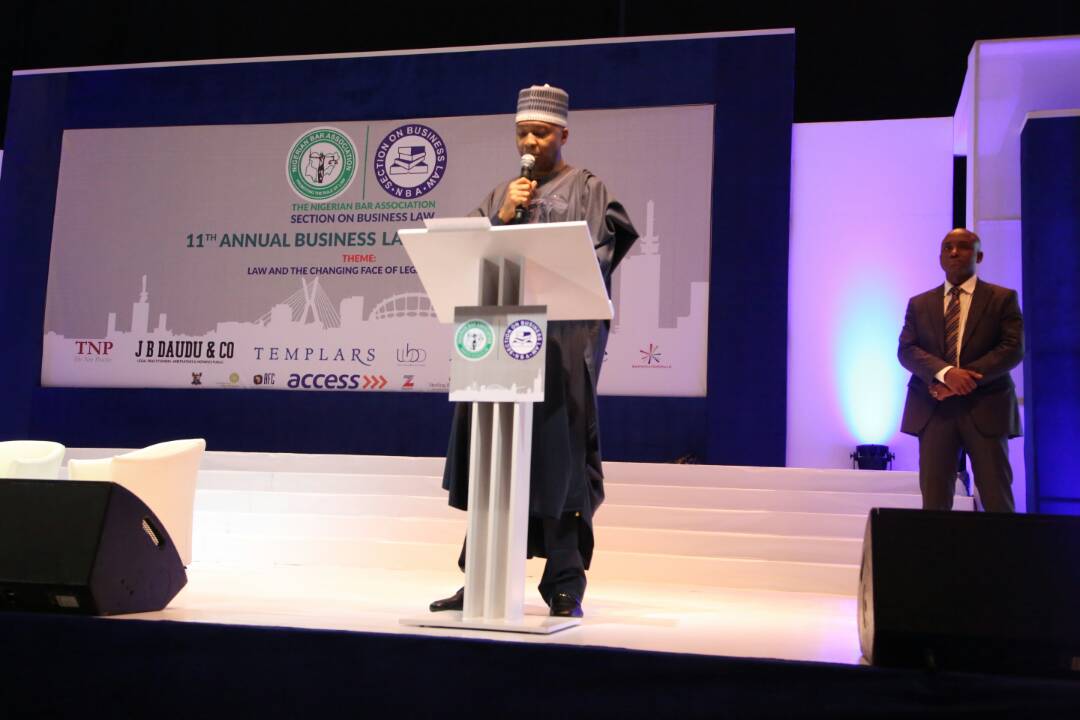Economy
Smuggling May Wreck Buhari’s Economic Policy—Saraki Warns


By Modupe Gbadeyanka
Smuggling of goods into the country has been identified by the Senate President, Mr Bukola Saraki, as the greatest threat to the realization of the economic policies of the administration of President Muhammadu Buhari.
While declaring open on Monday a public hearing on tackling smuggling in the country organized by the Senate Committee on Customs, Excise and Tariffs at the National Assembly, Abuja, the number three citizen of Nigeria stressed that unless the monster of smuggling was tamed, efforts being made to diversify the economy from oil would not yield expected results.
In a statement issued by his Chief Press Secretary, Sanni Onogu, the Senate President called on the Committee and all the stakeholders present at the hearing to come up with relevant recommendations on the way forward to save the nation’s farmers, small scale industries and financial institutions from impending crisis.
“My personal presence here this morning along with the leader of the Senate is to make a point of the importance that this senate places on this subject matter,” Mr Saraki said.
“For me personally, it is my view that the singular greatest threat to our economy is this issue of smuggling. What is militating against the success of our government is this issue of smuggling,” he added.
The singular greatest threat to the delivery of the promises made by President Muhammadu Buhari on the diversification of the economy is this issue of smuggling.
“The level of smuggling that we are seeing cannot continue because they will definitely rubbish all the policies of government if allowed to go on. I am saying that with all sincerity and all level of responsibility and I tell you why. Today, the greatest threat to small holder farmers is smuggling.
“Today, rice farmers who have gone to take loans either from the CBN (Central Bank of Nigeria) or from commercial banks are being threatened by rice coming in from across the borders at highly subsidized rate.
“The meaning of that is that the imported rice will always be cheaper than those produced by our local farmers.
“A time will come, if we do not do anything that these farmers will not be able to pay their loans to the banks and this will result in serious crisis.
“The banks that have given loans to these farmers, will also have crisis in their hands. And for the central bank that has intervened with billions of Naira again will not be able to recoup their money.
“The processors who have invested in rice mills at the beginning of this administration will also be threatened if we do not address the issue of rice smuggling,” he said.
Mr Saraki also stated that if smuggling is not stopped, the over $7billion invested by the government in the last 10 years to stimulate local production will go to waste.
“As a country we have invested over $7billion over the last 10 years in stimulating local production,” Saraki said. “If we do not address the area of smuggling, this investment will go to waste. This is the severity of the issue before us today.
“Any institution, whether it is the National Assembly or any other one, in order to support the success of our President, we must join to stop smuggling, without it, we should just forget the issue of diversification or increased agricultural production.
“We will only pay lip service to issue of agricultural production if we do not address the issue of smuggling and that is why I made it a point to come here personally to drive this message.
“I am confident that with the caliber of members of this Committee and the stakeholders here, that we will use this opportunity to come out with robust solutions on the way forward”, the Senate President.
He insisted that smugglers must be stopped to prevent them from further sabotaging the economy.
“There is no government, any serious government, that will render itself helpless because we must know the individuals who are doing this smuggling. We must be able to know who they are. Is it that they are larger and bigger than government?
“Is it that we cannot stop them? Or is it that we don’t want to stop them? Or is that we lack the competence to stop them? These are the questions that we put before us today. We must stop them. Customs must do what it takes to stop smuggling. These are the largest economic saboteurs that are ruining our economy. We must be able to identify them. They must be made to realize that we are serious about this issue.
“We must be able to sanction officers who are responsible for this and we must be able to reward officers who prevent the issue of smuggling. We want this Committee to sit down for the length of days of public hearing and ask ourselves what is the way forward. I can assure you that our responsibility as a Senate is to ensure that whatever recommendations are made by this Committee we have to send them back to the executive because as I said this matter is the singular greatest threat to our economy and to this government”, he said.
The Senate President noted that while Nigeria must continue to respect international treaties, it cannot afford to do so at the detriment of its economy.
“There are other issues, of course, that have to do with the ECOWAS treaties and agreements,” Saraki said. “Yes, we are part of ECOWAS. Yes, we want to develop ECOWAS, but no serious country will allow anything that will ruin its economy at the benefit of its neighbouring countries.
“We must be able to do what is right. So on this note, all hands must be on deck to ensure that we address this problem squarely. I assure you of the greatest support of this Senate,” Mr Saraki said at the hearing.
He urged the Comptroller General of Customs, Colonel Hamid Ali to prove his mettle by stopping the incidence of smuggling across the nation’s borders.
“To the Comptroller General of Customs, let me say on a lighter note, that once you end smuggling, even if you want to wear jeans and T-Shirt, I will move the motion that you should wear jeans and T-Shirt,” Saraki said. “But on a serious note, this issue is very important. Let us all work towards ending this menace once and for all.”
Earlier, Chairman of the Senate Committee on Customs, Excise and Tariffs, Mr Hope Uzodinma, said the public hearing was part of the committee’s holistic investigation into the operations of the Comprehensive Import Supervision Scheme (CISS) with a view to identify the factors responsible for increasing rate of smuggling of goods into the country.
He said that the exercise was also aimed at proffering solutions to the menace of smuggling and recommend appropriate penalties to be visited on perpetrators.
Economy
Investors Gain N333bn Trading Nigerian Equities

By Dipo Olowookere
A 0.31 per cent gain was recorded by the Nigerian Exchange (NGX) Limited on Tuesday, helped by renewed bargain-hunting by investors, with the year-to-date return extending to 6.61 per cent.
It was observed that the growth achieved by Customs Street yesterday was supported by the banking and the industrial goods indices, which went up by 1.32 per cent and 0.69 per cent apiece.
They offset the losses recorded by the three other sectors, with the insurance counter down by 1.32 per cent, the consumer goods segment down by 0.23 per cent, and the energy space down by 0.17 per cent.
At the close of business, the All-Share Index (ASI) increased by 516.94 points to 165,901.57 points from 165,384.63 points and the market capitalization appreciated by N333 billion to N106.495 trillion from N106.162 trillion.
The market breadth index was positive yesterday after the bourse ended with 35 price gainers and 34 price losers, representing bullish investor sentiment.
The quartet of Industrial and Medical Gases (IMG), Union Dicon, Zichis, and Austin Laz chalked up 10.00 per cent each to sell for N34.65, N9.90, N5.06, and N4.07, respectively, while RT Briscoe appreciated by 9.95 per cent to N9.50.
On the flip side, Omatek lost 10.00 per cent to trade at N2.43, Cutix also fell by 10.00 per cent to N3.15, Union Homes shrank by 9.95 per cent to N76.90, Sunu Assurances declined by 9.94 per cent to N4.62, and Deap Capital crashed by 9.93 per cent to N7.62.
During the trading day, 736.4 million stocks worth N24.7 billion exchanged hands in 46,026 deals compared with the 762.8 million stocks valued at N18.4 billion traded in 55,374 deals a day earlier, indicating a rise in the trading value by 34.24 per cent, and a slip in the trading volume and number of deals by 3.46 per cent and 16.88 per cent apiece.
The activity chart was led by volume on the second trading session of the week by GTCO with 65.9 million equities valued at N6.5 billion, Chams transacted 55.7 million shares worth N249.8 million, Custodian Investment traded 49.8 million stocks for N2.2 billion, Universal Insurance sold 36.1 million equities valued at N51.5 million, and Zenith Bank exchanged 35.4 million shares worth N2.6 billion.
Economy
Oil Market Rises 2% on Fresh Iran-US Confrontation

By Adedapo Adesanya
The oil market was up by nearly 2 per cent on Tuesday after the United States shot down an Iranian drone approaching an aircraft carrier and armed boats in the Strait of Hormuz, stoking concerns talks aimed at de-escalating US-Iran tensions could be disrupted.
This action caused the Brent futures to rise by $1.03 or 1.6 per cent to $67.33 per barrel, as the US West Texas Intermediate (WTI) futures jumped by $1.07 or 1.7 per cent to $63.21 a barrel.
Both crude benchmarks dropped more than 4 per cent on Monday after President Donald Trump said Iran was seriously talking with America.
However, the US military shot down an Iranian drone that “aggressively” approached the Abraham Lincoln aircraft carrier in the Arabian Sea on Tuesday.
In the Strait of Hormuz between the Persian Gulf and the Gulf of Oman, Iranian gunboats approached a US-flagged oil tanker in what US and British maritime security sources describe as a failed attempt to interfere with the vessel’s transit.
Members of the Organisation of the Petroleum Exporting Countries (OPEC) including Saudi Arabia, Iran, the United Arab Emirates, Kuwait and Iraq export most of their crude via the strait, mainly to Asia. The Strait of Hormuz, through which roughly a fifth of the world’s oil supply passes, remains Iran’s most obvious pressure point.
Despite the latest development, the UAE urged Iran and the US on Tuesday to use the resumption of nuclear talks this week to resolve a standoff that has led to mutual threats of air strikes. Iran, meanwhile, is demanding that talks be held in Oman not Turkey.
In Ukraine, President Volodymyr Zelenskiy accused Russia on Tuesday of exploiting a US-backed energy truce to stockpile munitions, and using them to attack Ukraine a day before peace talks. This boosted worries that Russia’s oil would remain sanctioned for longer.
On Monday, President Trump announced a trade deal with India, one of the world’s biggest economies and oil importers, on Monday to cut tariffs to 18 per cent from 50 per cent in exchange for the country halting Russian oil purchases and lowering trade barriers.
The American Petroleum Institute (API) estimated that crude oil inventories in the US decreased by 11.1 million barrels in the week ending January 30. Crude oil inventories decreased by 247,000 barrels in the week prior.
Official data from the US Energy Information Administration (EIA) will be published later on Wednesday.
Economy
AFC Commits Support to Transformative Reforms in Nigeria’s Power Sector

By Adedapo Adesanya
The Africa Finance Corporation (AFC), the continent’s leading infrastructure solutions provider, has reiterated its commitment to playing a pivotal role to support transformative reforms in Nigeria’s power sector.
This is as it act as co-Financial Adviser to the Nigerian government on the successful issuance of the recent N501 billion inaugural tranche under the Presidential Power Sector Financial Reforms Programme (PPSFRP), as part of the N4 trillion Power Sector Bond Programme, aimed at resolving over a decade of legacy debt obligations in Nigeria’s electricity supply industry and restoring financial stability across the sector.
AFC provided comprehensive financial advisory services to the federal government, including the design of the Programme’s negotiation strategy framework, support in negotiating and executing Settlement Agreements with Power Generation Companies (GenCos), and structuring the bond issuance. Working in partnership with CardinalStone Partners as co-Financial Advisers, AFC deployed its deep sector expertise and strong local market knowledge to deliver the landmark transaction.
The programme was overseen by the Presidential Power Sector Debt Reduction Committee (PPSDRC), with technical leadership from the Office of the Special Adviser to the President on Energy, and implemented through NBET Finance Company Plc, a special purpose vehicle of Nigerian Bulk Electricity Trading Plc (NBET). Proceeds from the issuance will be used to settle verified, overdue receivables owed to GenCos for electricity supplied between February 2015 and March 2025, injecting liquidity into the power sector and extinguishing long-standing claims.
Commenting on AFC’s involvement, Mr Banji Fehintola, Executive Board Member and Head, Financial Services at Africa Finance Corporation, said: “The successful issuance of the inaugural tranche under the Power Sector Bond Programme underscores AFC’s commitment to supporting transformative reforms in Nigeria’s power sector. By resolving long-standing liquidity challenges and restoring confidence among investors and operators, this transaction lays the foundation for sustainable growth and improved electricity supply across the country.”
When fully implemented, the programme is expected to impact approximately 5,398MW of electricity generation capacity by Nigerian GenCos and finalise settlement for 290,644.84GWh of electricity billed since 2015. It will also strengthen companies serving about 12 million active registered customers, creating a solid platform for new investments in capacity enhancement and expansion.
-

 Feature/OPED6 years ago
Feature/OPED6 years agoDavos was Different this year
-
Travel/Tourism9 years ago
Lagos Seals Western Lodge Hotel In Ikorodu
-

 Showbiz3 years ago
Showbiz3 years agoEstranged Lover Releases Videos of Empress Njamah Bathing
-

 Banking8 years ago
Banking8 years agoSort Codes of GTBank Branches in Nigeria
-

 Economy3 years ago
Economy3 years agoSubsidy Removal: CNG at N130 Per Litre Cheaper Than Petrol—IPMAN
-

 Banking3 years ago
Banking3 years agoSort Codes of UBA Branches in Nigeria
-

 Banking3 years ago
Banking3 years agoFirst Bank Announces Planned Downtime
-

 Sports3 years ago
Sports3 years agoHighest Paid Nigerian Footballer – How Much Do Nigerian Footballers Earn

















